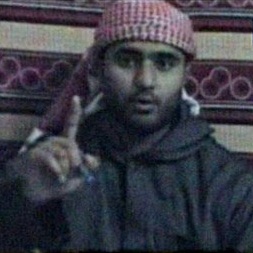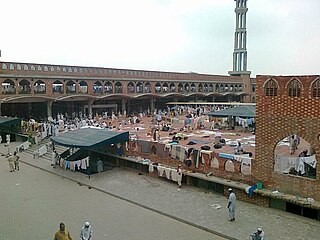
The Deobandi movement or Deobandism is a revivalist movement within Sunni Islam that adheres to the Hanafi school of law. It formed in the late 19th century around the Darul Uloom Madrassa in Deoband, India, from which the name derives, by Muhammad Qasim Nanautavi, Rashid Ahmad Gangohi, and several others, after the Indian Rebellion of 1857–58. The movement pioneered education in religious sciences through the Dars-i-Nizami associated with the Lucknow-based ulema of Firangi Mahal with the goal of preserving traditional Islamic teachings from the influx of modernist, secular ideas during British colonial rule. The Deobandi movement's Indian clerical wing, Jamiat Ulema-e-Hind, was founded in 1919 and played a major role in the Indian independence movement through its participation in the Pan-Islamist Khalifat movement and propagation of the doctrine of composite nationalism. The movement shares several beliefs with Wahhabism.

Tablighi Jamaat is a transnational Deobandi Islamic missionary movement that focuses on exhorting Muslims to be more religiously observant and encouraging fellow members to return to practising their religion as per the Islamic prophet Muhammad, and secondarily give dawah (calling) to non-Muslims. "One of the most widespread Sunni" islah (reform, and called "one of the most influential religious movements in 20th-century Islam," the organisation is estimated to have between 12 and 80 million adherents worldwide, in over 150 countries, with the majority living in South Asia.

Islam is the second largest religion in the United Kingdom, with results from the 2011 Census giving the total population as 2,786,635, or 4.4% of the total UK population, while the 2021 Census results released so far show a population of 3,868,133 (6.5%) in England and Wales, 3,801,178 in England and 66,950 in Wales. The 2011 census reported 76,737 Muslims in Scotland (1.45%). London has the greatest population of Muslims in the country. The vast majority of Muslims in the United Kingdom adhere to Sunni Islam, while smaller numbers are associated with Shia Islam.

Muḥammad Ilyās ibn Muḥammad Ismā‘īl Kāndhlawī Dihlawī was an Indian Islamic scholar who founded the Tablighi Jamaat Islamic revivalist movement, in 1925, in Mewat province.
Shehzad Tanweer was one of four Islamist terrorists who detonated explosives in three trains on the London Underground and one bus in central London during the 7 July 2005 London bombings. 56 people were killed and over 700 wounded in the attacks.

Mohammad Sidique Khan was a Pakistani-British terrorist and the oldest of the four Islamist suicide bombers and believed to be the leader responsible for the 7 July 2005 London bombings, in which bombs were detonated on three London Underground trains and one bus in central London, suicide attacks, killing 56 people including the attackers and injuring over 700. Khan bombed the Edgware Road train killing himself and six other people.

Stratford Street Mosque is a mosque in Beeston, Leeds, England.

Raiwind is a town located within union council 149 (Dholanwal) in Allama Iqbal Town of Lahore, Punjab, Pakistan. The town serves as the headquarters of Tablighi Jamaat and hosts the annual Raiwind Markaz Ijtema. Raiwind is also home to Pakistan Railways Junction and Railways Track Workshop and serves as the political base for former Prime Minister Nawaz Sharif.

Islam in England is the second largest religion after Christianity. Most Muslims are immigrants from South Asia or descendants of immigrants from that region. Many others are from Muslim-dominated regions such as the Middle East, Afghanistan, Malaysia and Somalia, and other parts of African countries such as Nigeria, Uganda and Sierra Leone. There are also many Caucasian Muslims in the country, of which most have Slavic and Balkan backgrounds, as well as some ethnic English converts.

Savile Town is a suburb of Dewsbury, Kirklees, West Yorkshire, England, lying just to the south of the River Calder.
Haji Muhammad Abdul Wahhab (Urdu: حاجی راو محمد عبد الوہاب, Ḥājī Muḥammad ‘Abdul-Wahhāb was an Islamic preacher and the emir of Tablighi Jamaat in Pakistan.

The Abbey Mills Mosque, also known as the London Markaz or Masjid-e-Ilyas, is a temporary mosque located in Stratford, east London, accommodating around 2,500 people. Plans were made to expand the capacity of the mosque to what would have been the largest religious building in Britain – three times the size of St Paul's Cathedral – and one of the largest mosques in western Europe. For this reason the proposed building is often informally referred to in the press as the "mega-mosque". The mosque extension was to have been built by Tablighi Jamaat, near the site of the London 2012 Olympic Park. Anjuman-e-Islahul Muslimeen, Tablighi Jamaat's charitable trust, has been the owner of the site since 1996. The Tablighi Jamaat website devoted to the mosque places the maximum capacity at 12,000 worshipers.

Malwali Masjid/Mosque, Kakrail Markaz is a mosque in the Kakrail neighbourhood of Ramna Dhaka, Bangladesh. Located near Ramna Park, it is the centre of the Tabligh Jamat in Bangladesh.
Nizamuddin Markaz, also called Banglewali Masjid, is a mosque located in Nizamuddin West in South Delhi, India. It is the birthplace and global centre of the Tablighi Jamaat, the missionary and reformist movement started by Muhammad Ilyas Kandhlawi in 1926.
Jihadi tourism, also referred to as jihad tourism or jihadist tourism, is a term sometimes used to describe travel to foreign destinations with the object of scouting for terrorist training. US diplomatic cables made public by WikiLeaks in 2010 have raised concerns about this form of travel. Within intelligence circles, the term is also sometimes applied dismissively to travellers who are assumed to be seeking contact with extremist groups mainly out of curiosity.
Raiwind Markaz is a complex consisting of a main mosque, Islamic madrasa, and residential areas located in Raiwind city, near Lahore, Pakistan, and is the home of the Tablighi Jamaat in Pakistan. It attracts many people to its yearly gathering, including international visitors.

Zubair-ul-Ḥassanc. was an Indian Islamic scholar and fourth emir of Tablighi Jamaat in India.
A Tablighi Jamaat religious congregation that took place in Delhi's Nizamuddin Markaz Mosque in early March 2020 was a COVID-19 super-spreader event, with more than 4,000 confirmed cases and at least 27 deaths linked to the event reported across the country. Over 9,000 missionaries may have attended the congregation, with the majority being from various states of India, and 960 attendees from 40 foreign countries. On 18 April, 4,291 confirmed cases of COVID-19 linked to this event by the Union Health Ministry represented a third of all the confirmed cases of India. Around 40,000 people, including Tablighi Jamaat attendees and their contacts, were quarantined across the country.
A Tablighi Jamaat religious congregation that took place in Lahore's Raiwind Markaz in early March 2020 was a COVID-19 super-spreader event with more than 539 confirmed cases linked to the event being reported across the country. Science and Technology Minister Fawad Chaudhry blamed the "stubbornness of the clergy" for the event having gone ahead despite the COVID-19 pandemic.
Hafiz Mohammed Patel was a British Asian imam known for his role in establishing the Tablighi Jamaat movement in the United Kingdom and for founding the Dewsbury Markaz mosque, the headquarters of Tablighi Jamaat in Europe.











